|
|
|
Sort Order |
|
|
|
Items / Page
|
|
|
|
|
|
|
| Srl | Item |
| 1 |
ID:
106707
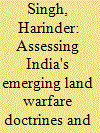

|
|
|
|
|
| Publication |
2011.
|
| Summary/Abstract |
This article attempts to locate and assess the sources of India's land warfare doctrines and capabilities. It begins by briefly examining the Indian army's significant combat experience in dealing with the external and internal security threats during the past six decades. The first section analyzes the security challenges and threats that presently drive the evolution of India's land war-fighting doctrines and capabilities. The next section explains the military imperatives that are driving this doctrinal change. In the next section, the current status of India's land war-fighting capabilities is discussed. The subsequent section examines the institutional limitations that inhibit organizational change, and the final section highlights how these doctrinal and capability gaps might be addressed in the future.
|
|
|
|
|
|
|
|
|
|
|
|
|
|
|
|
| 2 |
ID:
118140
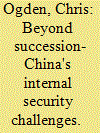

|
|
|
|
|
| Publication |
2013.
|
| Summary/Abstract |
China is undergoing a transitional period of rapid economic and social development. The way in which this period is managed will hold significant implications for the Chinese state concerning both its internal and external security. While fundamentally resting upon progressing from a developing to a developed economy, this transition highlights deep issues and tensions affecting China-ranging from rising societal inequalities to various separatism threats to mounting individualism. Regardless of internal succession struggles within the Communist Party of China (CCP), it is critical to focus upon this multitude of (mounting) social and economic issues-particularly outside of the political realm-that China's new leaders will have to face. Here, we highlight three themes central to this transition-a search for internal stability; China's multiple, interlocking internal issues; and the longevity, resilience and adaptability of the CCP-in order to assess their potential impact on China's domestic and, critically, external politics.
|
|
|
|
|
|
|
|
|
|
|
|
|
|
|
|
| 3 |
ID:
107619
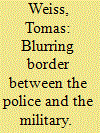

|
|
|
|
|
| Publication |
2011.
|
| Summary/Abstract |
This review article reviews the current 'state of the art' and literature on the role of the police and military within the changing nature of internal and external security. Some scholars believe that the border between these two forces has recently begun to blur, whereas others strongly disagree. This article argues that the current debate lacks comprehensiveness and conceptual underpinning. It is suggested that definitional differences between the two forces should serve as the basis for detailed and comprehensive future case studies.
|
|
|
|
|
|
|
|
|
|
|
|
|
|
|
|
| 4 |
ID:
106769
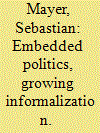

|
|
|
|
|
| Publication |
2011.
|
| Summary/Abstract |
This article investigates changes in the ways NATO and EU states have pursued security since the end of the Cold War, and the repercussions for the state monopoly of external force. Both organizations have autonomous roles, security identities and norm-shaping abilities, making them more consequential than is often acknowledged. Using the analytical concept of internationalization - the increasing importance of political or administrative authorities beyond the nation-state - this article scrutinizes the institutionalization of new functions, mechanisms and operational roles within NATO and the EU's Common Foreign and Security Policy. The resulting process of internationalization can be labelled embedded security politics, a political order characterized by fragmented responsibilities in which underlying national preferences are altered by transgovernmental and transnational contacts and pressure to reach consensus, by thicker institutional structures of rules and common practices that constrain national decision-making, and by schemes that subject national capabilities for autonomous action to institutional and physical constraints. The desirable degree of internationalization is still contested among capitals. There are also unspecific signs of an informalization of decision-shaping or -making: governments use ad hoc networks outside the treaty-based international organizations, allowing more freedom with regard to the interpretation of institutional obligations. The article concludes that internationalization and informalization have more in common than is often admitted, with fundamental implications for the future of national action and security cooperation.
|
|
|
|
|
|
|
|
|
|
|
|
|
|
|
|
| 5 |
ID:
121815
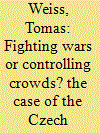

|
|
|
|
|
| Publication |
2013.
|
| Summary/Abstract |
The article explores the reform of the Czech military from the perspective of the possible blurring of police and military functions. The understanding of security has changed in recent years and the European militaries have taken up nontraditional tasks both within and outside Europe. Moreover, the fiscal conditions have provoked further reconsideration of the role of military. The Czech Republic's armed forces have undergone a number of reforms since 1989. The article focuses on three factors distinguishing the military from the police: territorial scope, use of force, and responsibility before the law. It concludes that although the Czech military has become more flexible, it does not use all its potential in practice, especially domestically. The article suggests that despite the adaptation to the new security environment, the military continues to be distinct from police.
|
|
|
|
|
|
|
|
|
|
|
|
|
|
|
|
| 6 |
ID:
154399
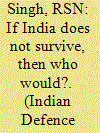

|
|
|
| 7 |
ID:
160283
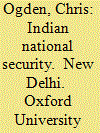

|
|
|
|
|
| Publication |
New Delhi, Oxford University Press, 2017.
|
| Description |
xxvi, 152p.pbk
|
| Series |
Oxford India Short Introduction Series
|
| Standard Number |
9780199466474
|
|
|
|
|
|
|
|
|
|
|
|
Copies: C:1/I:0,R:0,Q:0
Circulation
| Accession# | Call# | Current Location | Status | Policy | Location |
| 059486 | 355.033054/OGD 059486 | Main | On Shelf | General | |
|
|
|
|
| 8 |
ID:
174702
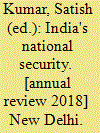

|
|
|
|
|
| Publication |
New Delhi, Pentagon Press, 2018.
|
| Description |
xxii, 416p.: maphbk
|
| Standard Number |
9789386618412
|
|
|
|
|
|
|
|
|
|
|
|
Copies: C:1/I:0,R:0,Q:0
Circulation
| Accession# | Call# | Current Location | Status | Policy | Location |
| 059910 | 355.033054/KUM 059910 | Main | On Shelf | General | |
|
|
|
|
| 9 |
ID:
149286
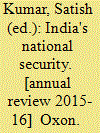

|
|
|
|
|
| Publication |
Oxon, Routledge, 2016.
|
| Description |
xvii, 442p.: ill.hbk
|
| Standard Number |
9781138282841
|
|
|
|
|
|
|
|
|
|
|
|
Copies: C:1/I:0,R:0,Q:0
Circulation
| Accession# | Call# | Current Location | Status | Policy | Location |
| 058900 | 355.033054/KUM 058900 | Main | On Shelf | General | |
|
|
|
|
| 10 |
ID:
141032
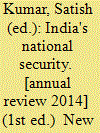

|
|
|
|
|
| Edition |
1st ed.
|
| Publication |
New Delhi, Routledge, 2015.
|
| Description |
xviii, 493p.: ill.hbk
|
| Standard Number |
9781138191273
|
|
|
|
|
|
|
|
|
|
|
|
Copies: C:1/I:0,R:0,Q:0
Circulation
| Accession# | Call# | Current Location | Status | Policy | Location |
| 058325 | 355.033054/KUM 058325 | Main | On Shelf | General | |
|
|
|
|
| 11 |
ID:
123844
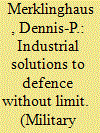

|
|
|
|
|
| Publication |
2013.
|
| Summary/Abstract |
Israel provides key capabilities, across the spectrum of conflict. The nature and duration of Israel's domestic and external security challenges has created a strong, indegenous and independent defence sector unusually well adapted to meeting the needs of conventional militrary forces against peer competitors, as well as those of homeland security without creating an artificial barrier between the two. Equally the modest domestic defence budget has, fromthe very start obliged those same companies to address international markets as a priority in order to ensure their commercial survival.
|
|
|
|
|
|
|
|
|
|
|
|
|
|
|
|
| 12 |
ID:
129973
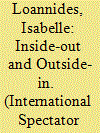

|
|
|
|
|
| Publication |
2014.
|
| Summary/Abstract |
The EU has increasingly intensified the link between its internal and external security concerns and needs, particularly in relation to its neighbours (the Western Balkans and the southern Mediterranean). This adaptation at legal, institutional, strategic and operational levels has sought to improve the coherence and effectiveness of EU external action. Yet, for the Union to tackle ongoing and new challenges in the immediate neighbourhood with today's financial and political constraints, it must be resourceful. The EU should make 'smart' use of its tools and capitalise on existing assets (reinforce the comprehensive approach, strengthen broad-based dialogue on security in the EU members states, and build relations of trust with third countries) to ensure that reforms in the immediate neighbourhood are sustainable, also for the benefit of long-term EU interests.
|
|
|
|
|
|
|
|
|
|
|
|
|
|
|
|
| 13 |
ID:
058129
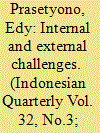

|
|
|
| 14 |
ID:
089126
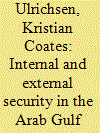

|
|
|
|
|
| Publication |
2009.
|
| Summary/Abstract |
This paper examines how the concept of "Gulf security" is evolving as internal political and socioeconomic changes in the Gulf states interact with the process of globalization and the impact of international events in this volatile region.
|
|
|
|
|
|
|
|
|
|
|
|
|
|
|
|
| 15 |
ID:
091852
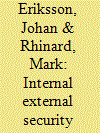

|
|
|
|
|
| Publication |
2009.
|
| Summary/Abstract |
The central contention of this article holds that scholars do not adequately assess and explain the influence of transboundary security issues on government behaviour. Their assessment is not adequate because they do not fully conceptualize the relationship between internal and external security concerns.
|
|
|
|
|
|
|
|
|
|
|
|
|
|
|
|
| 16 |
ID:
150756


|
|
|
| 17 |
ID:
124999
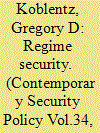

|
|
|
|
|
| Publication |
2013.
|
| Summary/Abstract |
The literature on the proliferation of chemical and biological weapons (CBW) emphasizes the role of external security threats as the primary motive for states to acquire and use these weapons. As recent events in Syria demonstrate, governments lacking political legitimacy may use these weapons to repress domestic challenges to their rule. The concept of regime security provides a theoretical framework for understanding how the threat of military coups, insurgencies, or domestic rivals influences the acquisition and use of CBW by authoritarian regimes. The cases of South Africa and Iraq illustrate how a government's concerns about internal security threats can impact its CBW proliferation decision-making. Omitting regime security as a factor in CBW decision-making may lead to the adoption of inappropriate nonproliferation and deterrent strategies. In light of Syrian President Bashar al-Assad's use of chemical weapons against his own people, developing a deeper understanding of the influence of regime security on the acquisition and use of chemical and biological weapons should be a priority.
|
|
|
|
|
|
|
|
|
|
|
|
|
|
|
|
| 18 |
ID:
144662
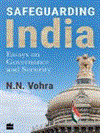

|
|
|
|
|
| Publication |
Noida, HarperCollins Publishers, 2016.
|
| Description |
x, 197p.hbk
|
| Standard Number |
9789351775423
|
|
|
|
|
|
|
|
|
|
|
|
Copies: C:1/I:0,R:0,Q:0
Circulation
| Accession# | Call# | Current Location | Status | Policy | Location |
| 058640 | 320.954/VOH 058640 | Main | On Shelf | General | |
|
|
|
|
| 19 |
ID:
131214
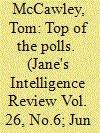

|
|
|
| 20 |
ID:
112156
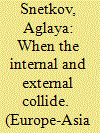

|
|
|
|
|
| Publication |
2012.
|
| Summary/Abstract |
This study provides a social constructivist reading of Russia's security policy under President Vladimir Putin, by investigating the relationship between the internal and the external security spheres and state identity through the prism of Russia's narrative on the fight against terrorism. Drawing on social constructivist theories of identity, security and narratives, it argues that a change occurred in the Putin regime's conceptualisation of Russian state identity: from an initially weak state which prioritised internal security threats and the fight against terrorism, to a strong state, whose main security 'Other' was the West, by the end of Putin's presidency. This resulted in less priority being given to the terrorism issue in the official discourse and the widening of the notion of 'threat' and 'terrorism', in line with a developing security narrative in both internal and external spheres.
|
|
|
|
|
|
|
|
|
|
|
|
|
|
|
|
|
|
|
|
|